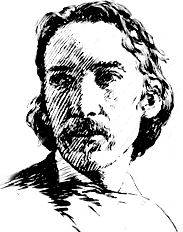Fables
By Robert Louis Stevenson

XVII. - Faith, Half Faith and No Faith At All.
IN the ancient days there went three men upon pilgrimage; one was a priest, and one was a virtuous person, and the third was an old rover with his axe.
As they went, the priest spoke about the grounds of faith.
“We find the proofs of our religion in the works of nature,” said he, and beat his breast.
“That is true,” said the virtuous person.
“The peacock has a scrannel voice,” said the priest, “as has been laid down always in our books. How cheering!” he cried, in a voice like one that wept. “How comforting!”
“I require no such proofs,” said the virtuous person.
“Then you have no reasonable faith,” said the priest.
“Great is the right, and shall prevail!” cried the virtuous person. “There is loyalty in my soul; be sure, there is loyalty in the mind of Odin.”
“These are but playings upon words,” returned the priest. “A sackful of such trash is nothing to the peacock.”
Just then they passed a country farm, where there was a peacock seated on a rail; and the bird opened its mouth and sang with the voice of a nightingale.
“Where are you now?” asked the virtuous person. “And yet this shakes not me! Great is the truth, and shall prevail!”
“The devil fly away with that peacock!” said the priest; and he was downcast for a mile or two.
But presently they came to a shrine, where a Fakeer performed miracles.
“Ah!” said the priest, “here are the true grounds of faith. The peacock was but an adminicle. This is the base of our religion.”
And he beat upon his breast, and groaned like one with colic.
“Now to me,” said the virtuous person, “all this is as little to the purpose as the peacock. I believe because I see the right is great and must prevail; and this Fakeer might carry on with his conjuring tricks till doomsday, and it would not play bluff upon a man like me.”
Now at this the Fakeer was so much incensed that his hand trembled; and, lo! in the midst of a miracle the cards fell from up his sleeve.
“Where are you now?” asked the virtuous person. “And yet it shakes not me!”
“The devil fly away with the Fakeer!” cried the priest. “I really do not see the good of going on with this pilgrimage.”
“Cheer up!” cried the virtuous person. “Great is the right, and shall prevail!”
“If you are quite sure it will prevail,” says the priest.
“I pledge my word for that,” said the virtuous person.
So the other began to go on again with a better heart.
At last one came running, and told them all was lost: that the powers of darkness had besieged the Heavenly Mansions, that Odin was to die, and evil triumph.
“I have been grossly deceived,” cried the virtuous person.
“All is lost now,” said the priest.
“I wonder if it is too late to make it up with the devil?” said the virtuous person.
“Oh, I hope not,” said the priest. “And at any rate we can but try. But what are you doing with your axe?” says he to the rover.
“I am off to die with Odin,” said the rover.
 Continue...
Continue...![[Buy at Amazon]](http://images.amazon.com/images/P/159572057X.01.MZZZZZZZ.jpg)